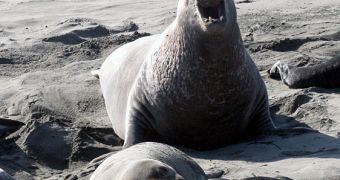For a long time, researchers have been puzzled at how seals rest. The marine creatures are at sea for as much as 8 months non-stop each year, and the short times they actually surface to catch a breath of fresh air are insufficient for even a nap. But now a new investigation may have uncovered the animals' rest mechanisms, Japanese experts at the Hokkaido University say. They reveal that northern elephant seals (Mirounga angustirostris) sleep as they sink slowly through the water, but only after they reach a certain depth, LiveScience reports.
These animals have a very peculiar behavior once in the water, in the sense that they tend to dive very fast to at least 500 feet after surfacing for oxygen replenishing. Scientists hypothesize this happens because this depth makes them relatively safe from their main predators, killer whales and white sharks, creatures that mostly cruise above this threshold. After moving deeper than this, the “falling-leaf phase” of their descent begins. The team proposes that it is during this phase that the seals get their much-needed rest, but only in very small time increments.
For the investigation, the scientists outfitted about six younger elephant seals with advanced surveillance equipment known as data loggers, as well as with satellite transmitters, and followed the creatures for several days. The loggers were capable of collecting data such as the path of movement the animals took (in 3D)m the number and intensity of their flipper strokes, as well as the overall position of their bodies. The team learned that, as the seals entered the falling-leaf phase, they simply rolled over on their backs, and began sinking without moving their flippers, and at very low speed, for 12 to 15 minutes.
The experts propose that the animals sink backwards so as to avoid the influence that ventral bubbler exerts on their bodies when they are unresponsive. Research group members say that the animals must be sleeping as they peacefully dive lower and lower, and argue that some of the creatures they studied even hit the bottom of the ocean – when they were swimming in shallower waters – without reacting to this at all. But the scientists argue that the short time these animals need to sleep may actually have useful implications. Because they sink very slowly, seals can always dart up for air if the need arises. Details of the new investigation appear in the latest issue of the respected scientific journal Biology Letters.

 14 DAY TRIAL //
14 DAY TRIAL //